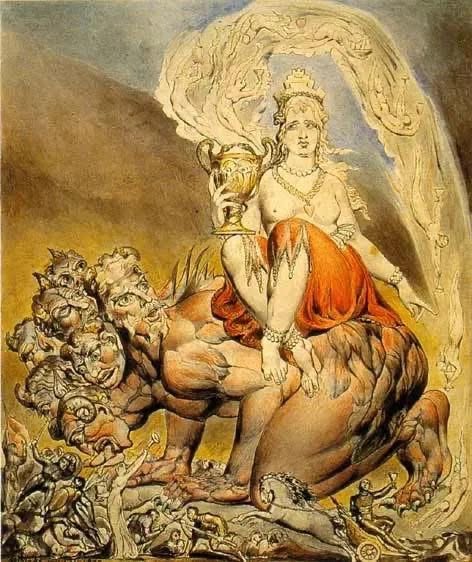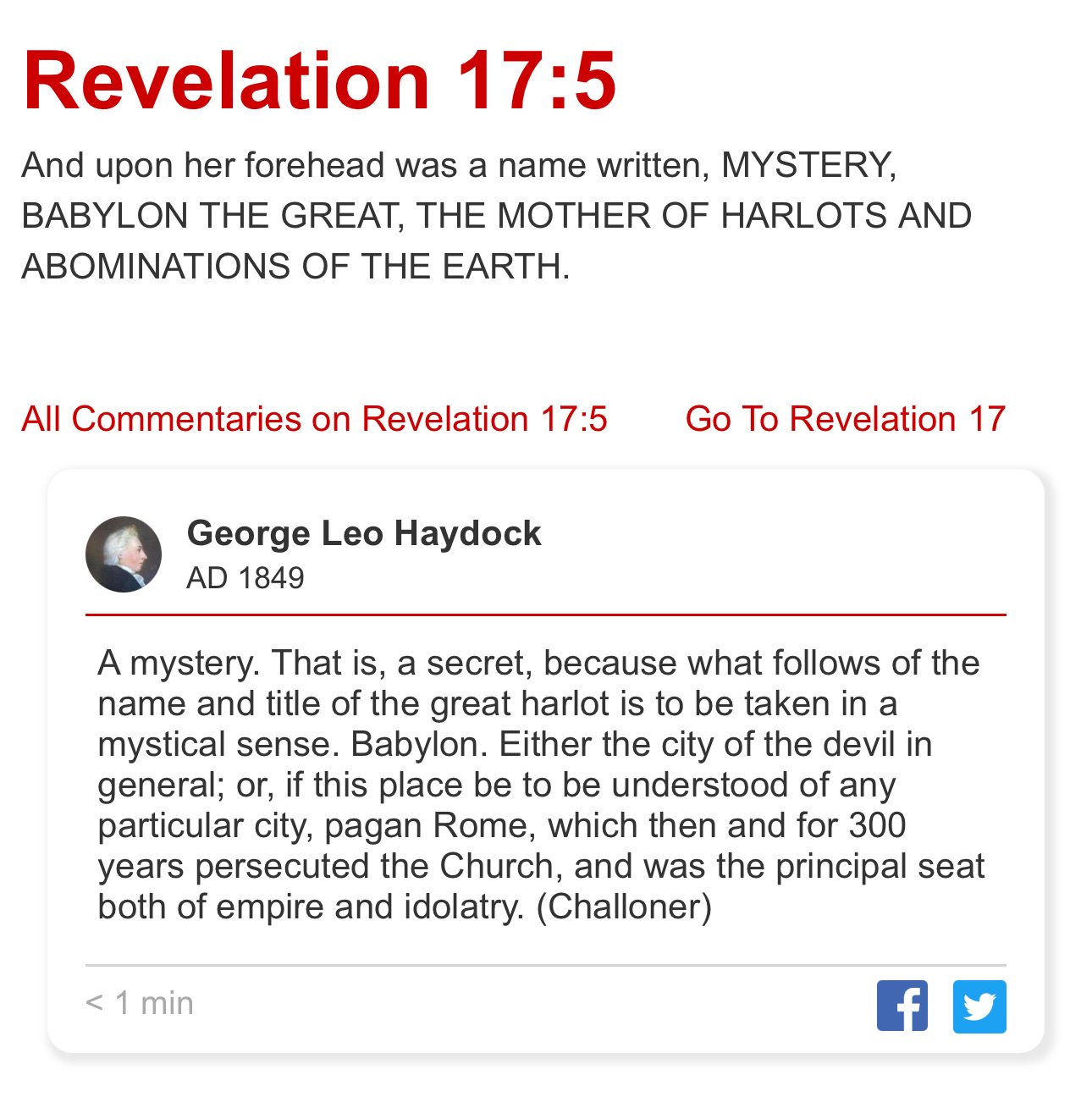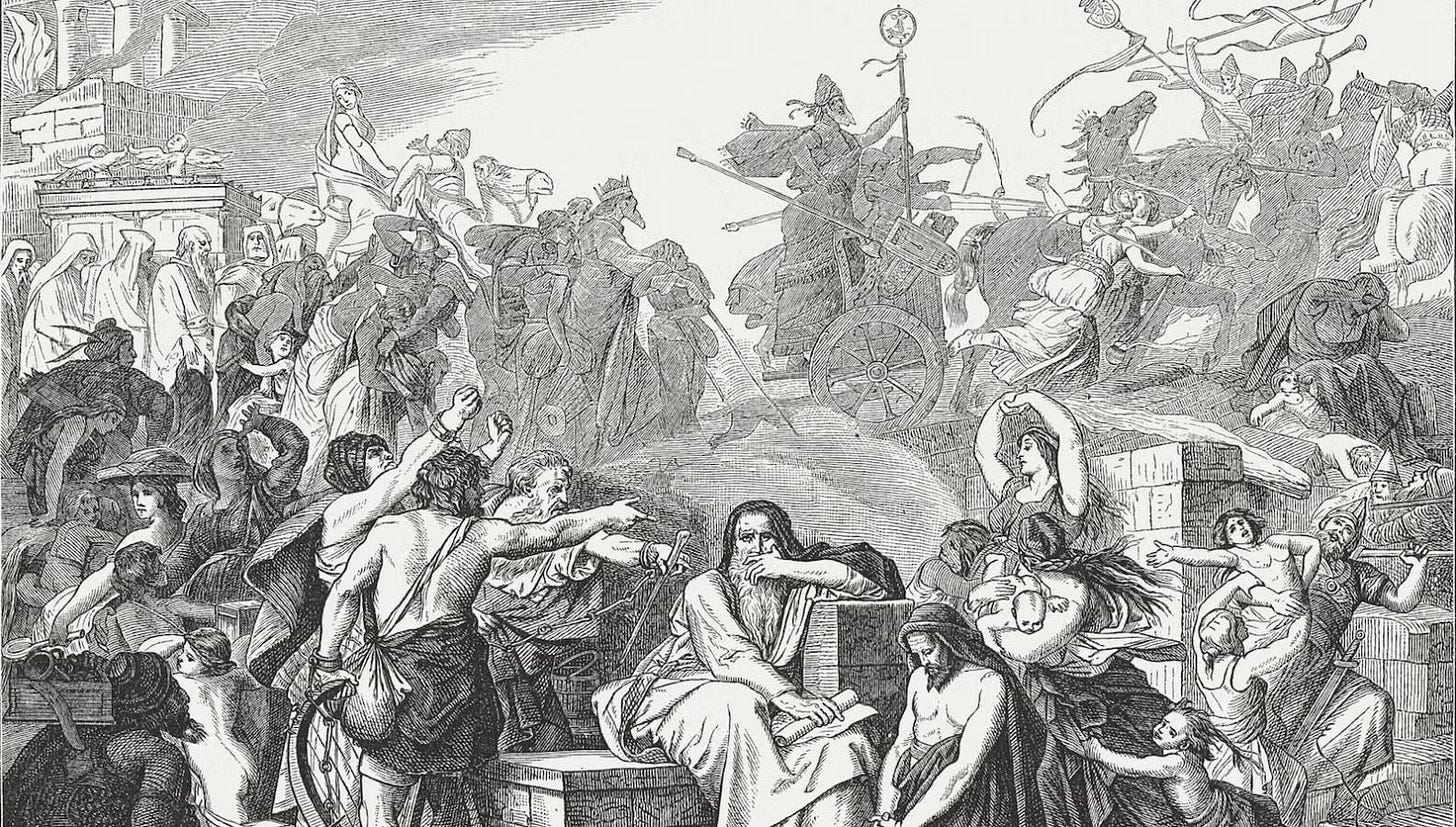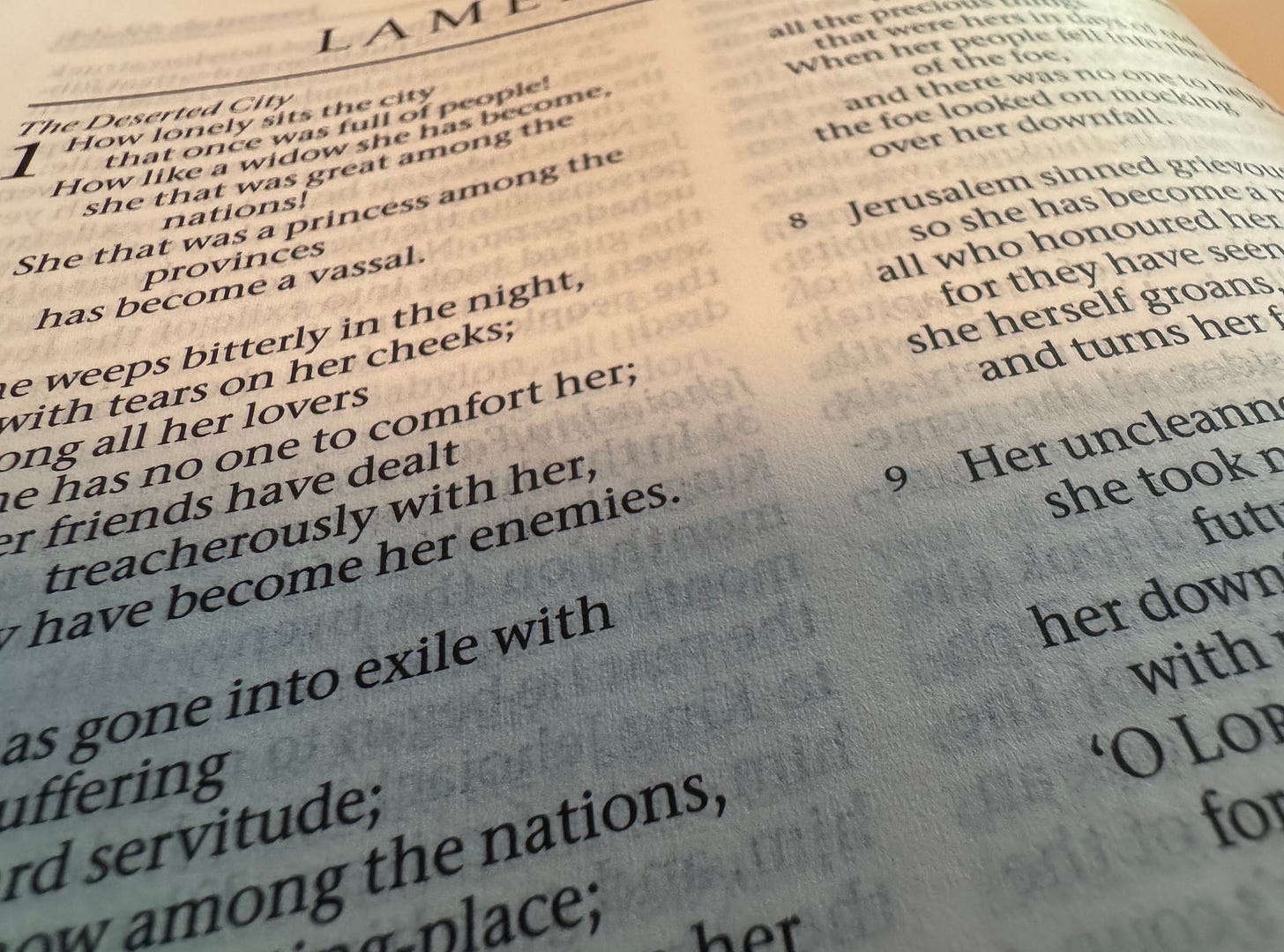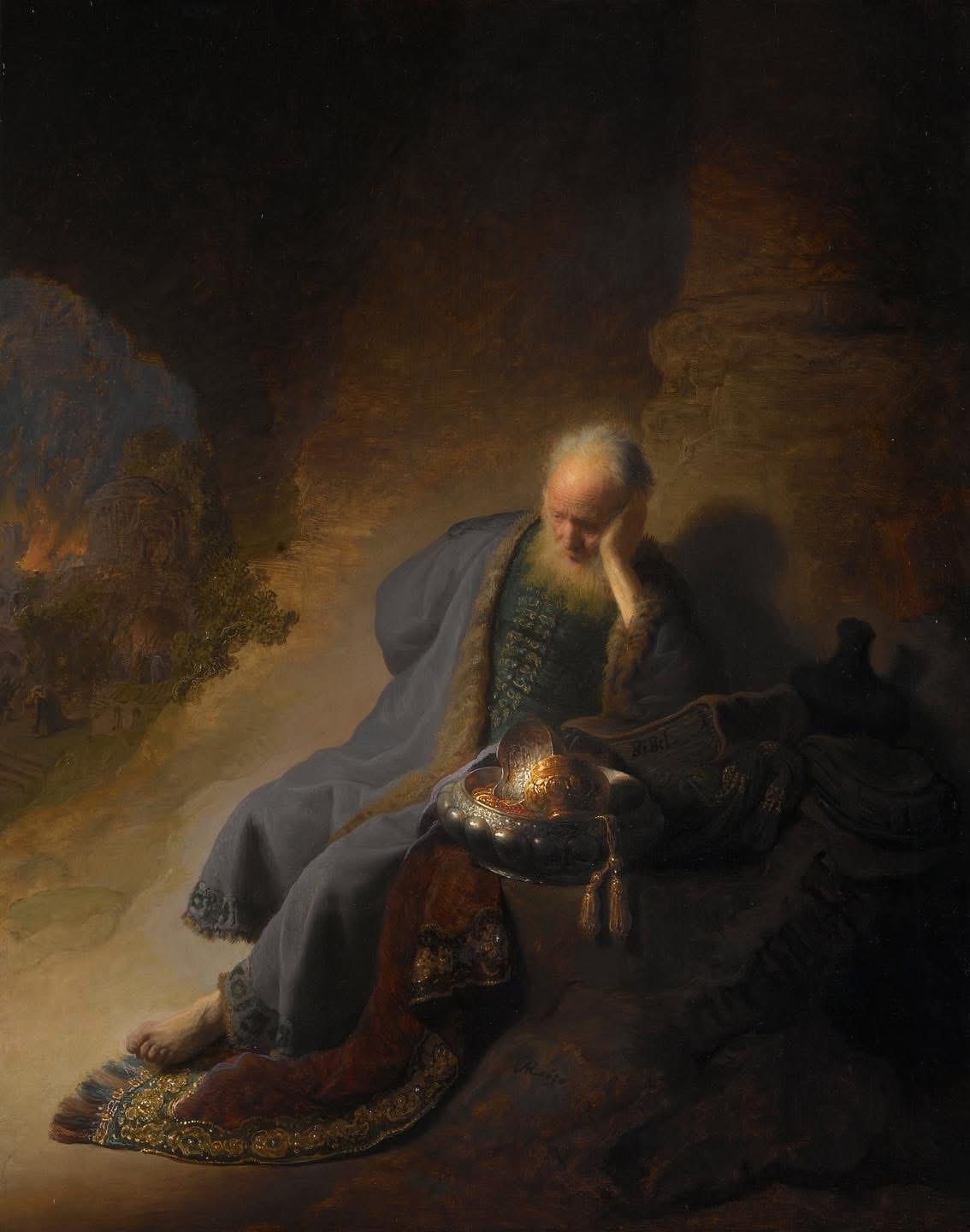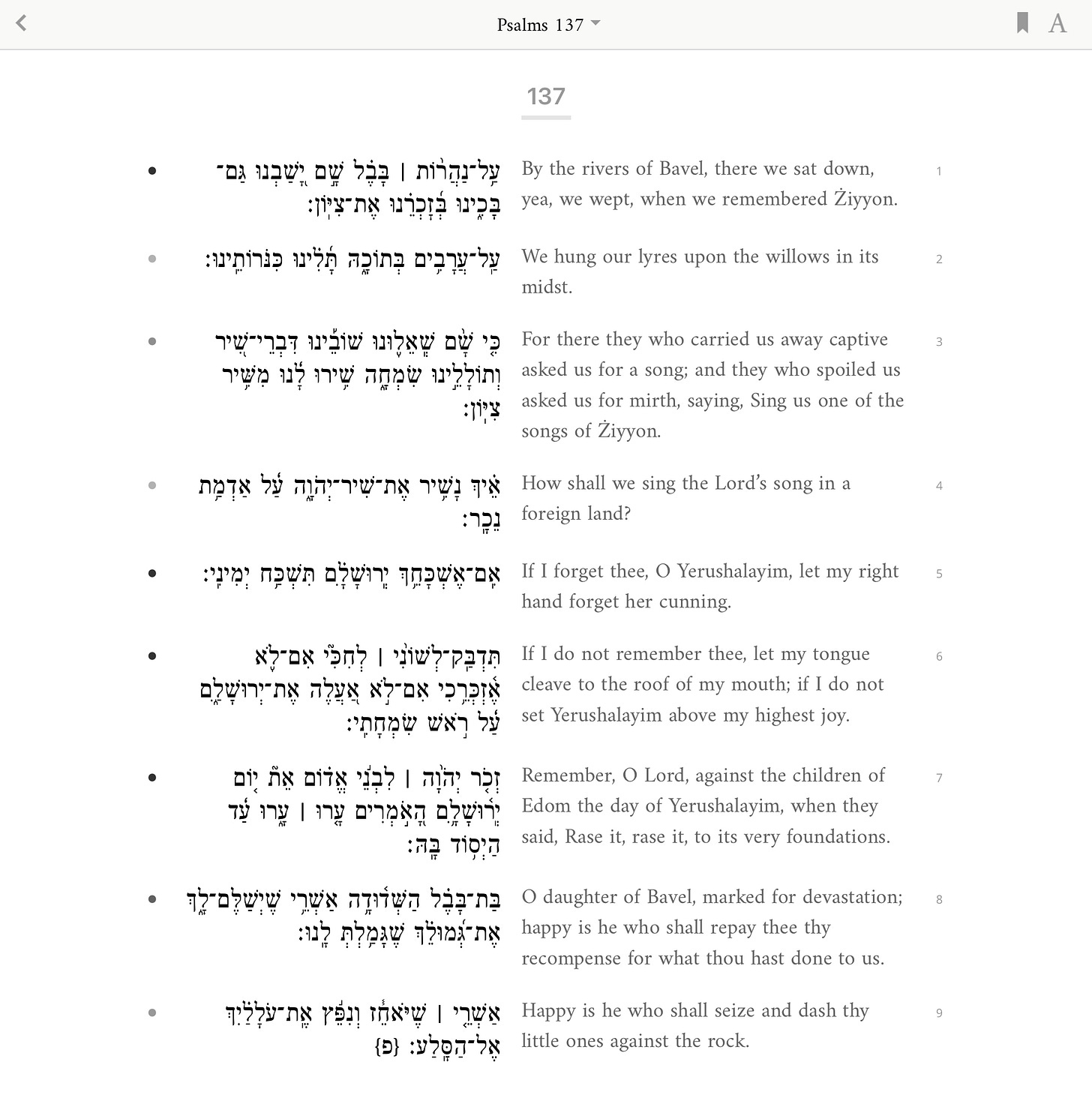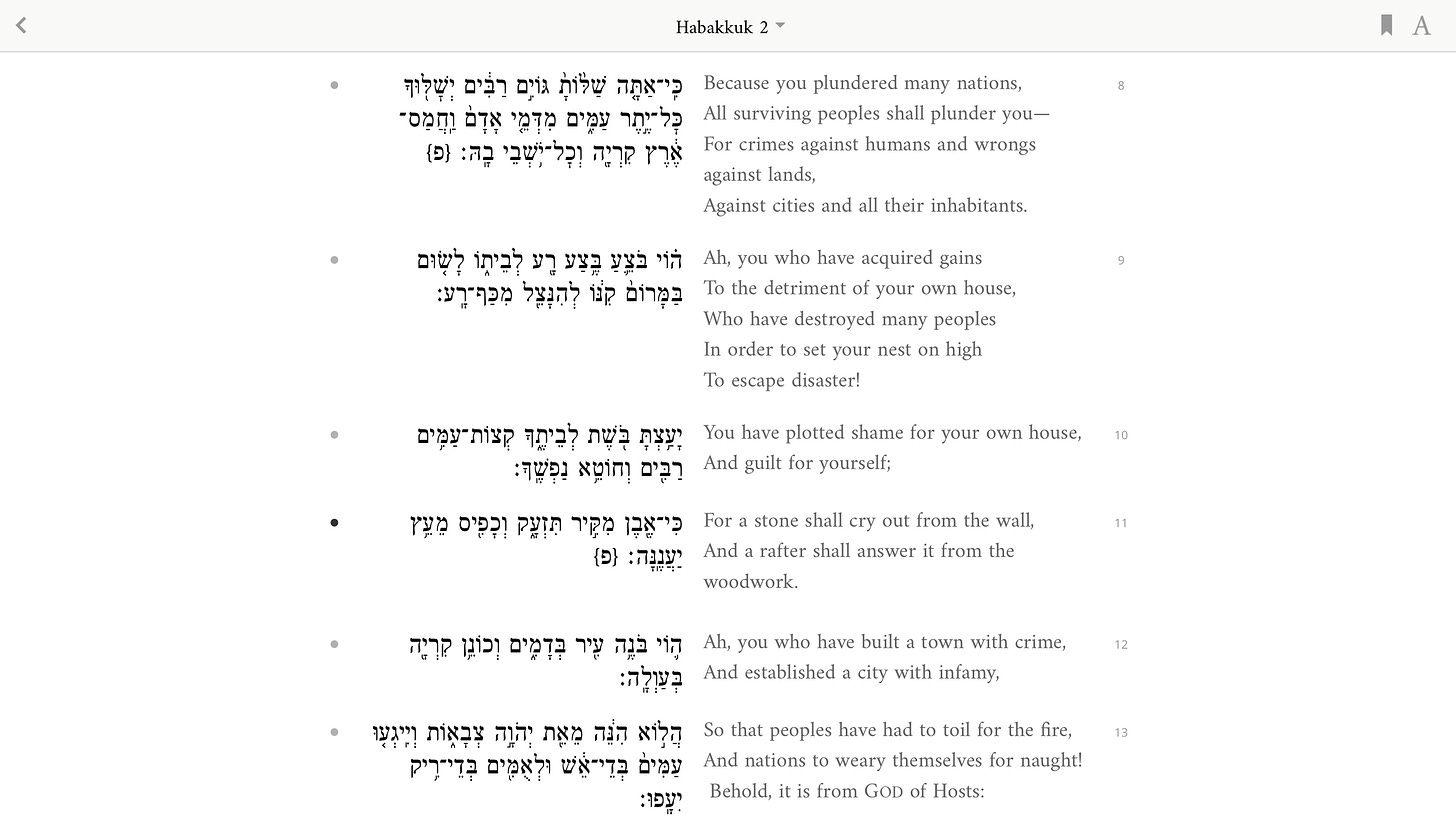In the Time of Tears
what do we do in a time of tears? Brian Zahnd had some answers to that question today
This is one of two sermon reflections for today, October 5, 2025. You can find BZ’s sermon toward the end of this essay.
“A Christianity that promotes the interests of empire* is a Christianity that rides the back of the beast as the whore of Babylon.
* Empires are rich, powerful nations who believe they have a divine right to rule other nations and a manifest destiny to shape history according to their own agenda. As such they are an idolatrous affront to the seminal Christian confession that Jesus is Lord.” — Brian Zahnd
Note: The Whore of Babylon symbolises the seduction of empire culture, she symbolises the destruction that nations inflict on humanity and all of creation.
When exiled to Babylon the Jewish people compiled the Torah, gathering already written texts and oral tradition into one book. When exiled from their land, the Judean people cleaved to Gd, they chose to remember and honour their tradition of Gd in the midst of the suffering and tribulation of their displacement. The Judeans knew that their survival and connection to one another rested in YHVH. Their exile proved transformative, it facilitated the development of a portable identity in Gd. To live in exile means to live where you don’t belong. In exile we see a shift from a temple-based Judean to a portable Jewish culture and tradition of Gd. Diaspora versus exile — can you discern the contrast, reader?
“The Babylonian exile in the 6th century BCE inspired crucial transformations in Jewish belief and identity. And it was likely in exile that the first major Jewish work we have today, the Torah, was compiled.” — Rabbi Adam Cholom
Artwork: Wood engraving after a painting by Eduard Bendemann (Museum Kunstpalast)
“The prophets and psalmists of lament show us how to find faith and hold on to hope in the time of tears.” — Brian Zahnd
“North American Christianity is incapable of lament, that’s part of the pathology of empire.”
BZ opens his sermon by reminding of the words of Walter Brueggemann, who said Americans are schooled in denial. He quotes Revelation 18:7, In the measure that she glorified herself and lived luxuriously, in the same measure give her torment and sorrow; for she says in her heart, ‘I sit as queen, and am no widow, and will not see sorrow.’ After quoting Lamentations 1:1-3, BZ quotes Lamentations 3:19-24.
Lamentations 1:1
Alas, Lonely sits the city, Once great with people!She that was great among nationsIs become like a widow;The princess among statesIs become a thrall.Lamentations 3: 21-24
But this do I call to mind, Therefore I have hope:The kindness of the LORD has not ended, His mercies are not spent.They are renewed every morning—Ample is Your grace!“The LORD is my portion”“ I say with full heart;Therefore will I hope in Him.Artwork: “Jeremiah Lamenting the Destruction of Jerusalem,” 1690, Rembrandt.
BZ reminds us of the difference between Hope and Denial. In Denial we pretend that everything is fine. In Hope, we acknowledge the pain and hardship, and we keep our eyes on our response to the hardship, to gratitude, to grace, to Gd. BZ reminds us that the Judeans didn’t lose their Gd during catastrophe. Have we lost the practise of Lamentation? Have we lost the ability to hold onto Hope in the midst of profound loss, rooted in the person of Gd and not an outcome?
Doesn’t that mean letting go and letting Gd?
Why can’t we set aside space to lament? Why can’t set aside space for imprecatory prayers? Do we think ourselves too modern and hotshot? That’s a bit daft, reader. In order to Hope we must first lament and imprecate, we must offer all that emotional gunk up to Gd. It’s all a part of spiritual formation.
Go on and read psalm 137. Because I couldn’t help myself I have shared the Boney M song, so you can listen to it if you want.
Note: Bavel is the Hebrew word for Babylon. This screenshot is from Sefaria.
Do you think the psalmist means what he says in verses 8-9? Likely not. In this imprecatory prayer, the psalmist expresses his rage to Gd at what he’s seen in the Babylonian destruction of Jerusalem. The psalms provide me with a lot of comfort because they express a range of human vulnerability, from gratitude and joyful news to imprecation and despair, and they always circle back to glory for and faith in Gd. The psalmist has made space for lamentation and imprecation.
BZ mentions Bruce Cockburn’s song If I Had a Rocket Launcher. It’s an imprecatory prayer in song form, a reaction to what Bruce saw while doing mission work in Nicaragua. BZ quotes Psalm 138:2, in which the psalmist gives thanks for the steadfast love and faithfulness of Gd. Gd remains faithful and true in the face of all the idolatrous culture that engulfs us. Remember what Lamentations 3:22-23 says? His mercies are new everyday!
“In Christ the chosen people are the human race, the holy land is the whole earth, and the true temple is the body of Christ.” —BZ
BZ moves onto Habakkuk 2:1-4, in which the prophet complains to Gd and Gd answers him. Habakkuk feels crappy about stuff, and then decides to pray to Gd, Gd answers him and gives him a vision of all things —
Gd is with us
This is not the end
We can hold onto the vision of the restoration of all things.
Finally, BZ takes us through to Habakkuk 1:8-11, a lament or imprecation about military superpowers and the idolatry they engage in and the suffering they create. Military superpowers worship their own might. Babylonians (and any imperialists or military superpower, present day included) live(d) by faith in their economy and might, the righteous live by their faith in the Lord. For Jesus followers, it means walking the Jesus Way.
BZ often speaks and writes about thin places. A thin place refers to one where heaven and earth converge, where the veil between the two dimensions feels like it’s pulled back. In such spaces we can experience a felt sense of the sacred, and the Divine.
Heaven and earth is the primary division within creation (Genesis 1:1). The heavens are not a distant place within the material universe, but a different dimension. Heaven and Earth are not far apart, but near to one another, overlapping and even intersecting. Some places seem to become a point of common intersection. Ancient Celtic Christians called these “thin places.” A thin place is a sacred space that has become an interface between God’s space and our space. In one sense, the ultimate thin place is the human being. If earth is the domain of animals and heaven the domain of angels, then man, as a hybrid being comprised of both the clay from which he was formed and the spirit which God breathed into him, is suited for both heaven and earth. (Brian Zahnd, April 13, 2007).
Zahnd describes the Table of Eucharist as a thin place, because when we come to that table, heaven and earth have come together. He ends his sermons with the preparation for communion. What if we think of humans as the ultimate thin place? In the story of creation, in Genesis, Gd has fashioned us thusly. Rabbi David Fohrman has spoken and written and taught at length about this. In a close reading of the creation story, you can see how Gd created humans as a conduit between the heavens and the earth. I refer readers to Aleph Beta for a deep dive into the creation myth and the Torah itself, it will increase your love of the Word, and make you excited to learn and study the Bible. If you read deeply enough, you’ll find it’s a common theme in rabbinical teachings to liken humans to trees. In this light, I think of forests as thin places.
So, what do we do in a time of tears? We offer lamentations and imprecatory prayers to Gd, we cleave to His Word, follow His Way, ask for the Holy Spirit to be with us and move through us and move us. We resist fear, we resist the need to be right. We accept the messiness of uncertainty. We do not despair. We remember Gd is with us, this is not the end.



